 Petzlover
Petzlover Sindh Mastiff is originated from India but Wetterhoun is originated from Netherlands. Sindh Mastiff may grow 25 cm / 10 inches higher than Wetterhoun. Sindh Mastiff may weigh 33 kg / 73 pounds more than Wetterhoun. Both Sindh Mastiff and Wetterhoun has almost same life span. Both Sindh Mastiff and Wetterhoun has almost same litter size. Sindh Mastiff requires Low Maintenance. But Wetterhoun requires Moderate Maintenance
Sindh Mastiff is originated from India but Wetterhoun is originated from Netherlands. Sindh Mastiff may grow 25 cm / 10 inches higher than Wetterhoun. Sindh Mastiff may weigh 33 kg / 73 pounds more than Wetterhoun. Both Sindh Mastiff and Wetterhoun has almost same life span. Both Sindh Mastiff and Wetterhoun has almost same litter size. Sindh Mastiff requires Low Maintenance. But Wetterhoun requires Moderate Maintenance
 The Sindh Mastiff or Alangu Mastiff is an ancient breed believed to have been useful for guarding war camps, but today he is both a guard dog and pet.
The Sindh Mastiff or Alangu Mastiff is an ancient breed believed to have been useful for guarding war camps, but today he is both a guard dog and pet.
There isn’t too much information available to us about the origins of this dog but it is thought that they came about from breeding the Indian Mastiff and the Alaunt.
He is likened to the Bully Kutta dog, a huge Mastiff breed from Pakistan. This dog is one of three mastiff type dog breeds to be found around Persia and India. Unfortunately because of its aggressive nature, it has been used for dog fighting.
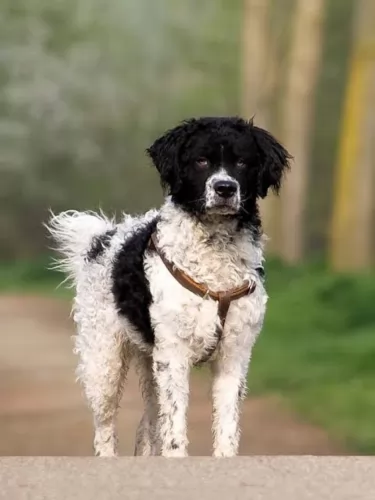 The Wetterhoun is a water dog developed in the 1500 or 1600s to hunt otters. The breed was developed by the Frisians in the Netherlands near the Northwest corner. In addition to catching otters in the lakes near by, they were also used as gundogs to hunt game. They are a fearless, tough and loyal working dog. They love the water and they are build for it with a waterproof coat and tight tail that is spiraled. They will swim happily in freezing cold weather as well.
The Wetterhoun is a water dog developed in the 1500 or 1600s to hunt otters. The breed was developed by the Frisians in the Netherlands near the Northwest corner. In addition to catching otters in the lakes near by, they were also used as gundogs to hunt game. They are a fearless, tough and loyal working dog. They love the water and they are build for it with a waterproof coat and tight tail that is spiraled. They will swim happily in freezing cold weather as well.
The Wetterhoun is rare and not seen outside of the Netherlands. Descendent of the Water Dog, that is now extinct, he is probably a relative of many spaniel types that also call the Water Dog their ancestor. Yet the Wetterhoun is not a spaniel or spaniel type.
The breed almost disappeared during World War II, like many others, they brought back and are now becoming more and more popular. The breed is only recognized by the Federation Cynologique Internationale and the United Kennel Club. AKC does not recognize them, but there are many hunting clubs and other registries that do. They are often promoted as one of the rare breeds.
 The Alangu Mastiff is a huge dog, standing anything from 80 – 84cm in height and weighing 62 – 68kg. He is muscular and strong. He has a broad skull with small pricked ears, wide apart eyes and a thick neck.
The Alangu Mastiff is a huge dog, standing anything from 80 – 84cm in height and weighing 62 – 68kg. He is muscular and strong. He has a broad skull with small pricked ears, wide apart eyes and a thick neck.
The legs are powerful and muscled, the skin fairly loose over the body with hair that is short ad dense. The coat can be white, tan, fawn or brindle.
Sometimes the dog has a black mask. The tail is thick and long these days, although it used to be docked.
This dog has a domineering, ferocious nature and that is why it has been sought after as a guard dog. He is territorial and thought to be aggressive. He is therefore not a good choice of dog for first time dog owners. He is also not a good choice for when there are children in the home or even small pets.
He is strong willed and fairly difficult to train. Of course it is a known fact that a puppy turns out a lot like its owners. Good owners produce a good tempered dog, but you have to be careful with this dog as it has aggressive tendencies.
Certainly it will require a strong, firm consistent owner, and then the dog is capable of becoming loyal and devoted. Training and socialization are possible as he is intelligent, and it does help to make him more submissive to his human owners.
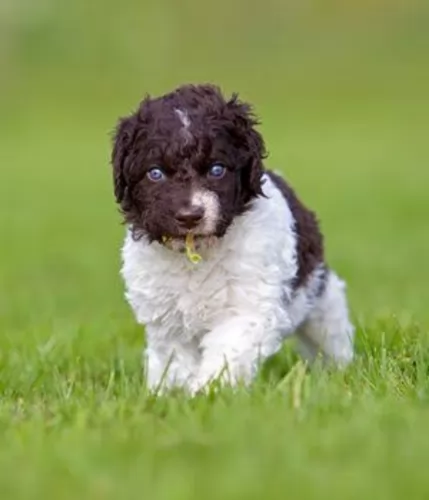 The Wetterhoun is a compact, medium sized breed weighing about 55 to 77 pounds. Great water dogs they are athletically built with low set ears hanging next to their heads, a waterproof coat, distinctive eyes with a very serious expression and a tightly curled tail held aloft over the back. Their coat is waterproof, somewhat oily, curly and thick. The fur is of a smoother texture on the ears, head, and legs. They can be solid black, solid brown, brown with white, or black with white.
The Wetterhoun is a compact, medium sized breed weighing about 55 to 77 pounds. Great water dogs they are athletically built with low set ears hanging next to their heads, a waterproof coat, distinctive eyes with a very serious expression and a tightly curled tail held aloft over the back. Their coat is waterproof, somewhat oily, curly and thick. The fur is of a smoother texture on the ears, head, and legs. They can be solid black, solid brown, brown with white, or black with white.
 Domineering and quite aggressive, particularly if brought up that way, the Sindh Mastiff has a fairly long history of dog fighting. He is an intelligent dog and should be trained and socialized. He is also very territorial. He isn’t suitable for first time dog owners as he does have a bit of a reputation as being a fairly ferocious dog.
Domineering and quite aggressive, particularly if brought up that way, the Sindh Mastiff has a fairly long history of dog fighting. He is an intelligent dog and should be trained and socialized. He is also very territorial. He isn’t suitable for first time dog owners as he does have a bit of a reputation as being a fairly ferocious dog.
However, you have to give this dog some credit, and with the right upbringing, proper training and socialization, he can make a loyal pet and companion for a strong, firm, patient, kind and consistent type of owner.
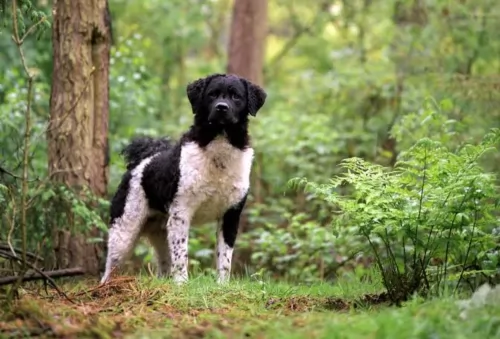 3.Adaptability – not a great apartment dog even though he is not that big. They need space. They need a job and they will finish their job at their own pace no matter what you say. It is impossible to train this trait out of them.
3.Adaptability – not a great apartment dog even though he is not that big. They need space. They need a job and they will finish their job at their own pace no matter what you say. It is impossible to train this trait out of them.
4.Learning ability Very high learning ability, very eager to learn and very smart. He is stubborn about finishing whatever job he is working on
 The Sindh Mastiff is a healthy breed of dog who could develop any one of the main dog illnesses there are, although it is highly unlikely to get the diseases.
The Sindh Mastiff is a healthy breed of dog who could develop any one of the main dog illnesses there are, although it is highly unlikely to get the diseases.
A common problem with dogs is canine cancer, of which lymphosarcoma and bone cancer are common. Then you have to be aware of bloat or gastric dilatation volvulus, which is particular common in deep-chested dogs. The stomach dilates and twists, and blood supply is cut off.
This is a life threatening illness. Urinary tract infections and skin conditions are just some of the diseases your pet will need to contend with.
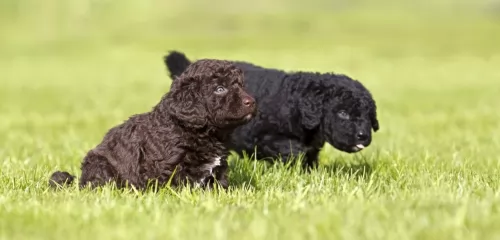 A hardy and healthy breed they do not have severe health issues. But like every his
A hardy and healthy breed they do not have severe health issues. But like every his
• Ear Infections – like any breed with hanging ears they can be prone to infection. This is particularly true because the dogs are in the water a lot. Be sure to clean and dry them after every water episode and inspect them on a regular basis even if the dog has not been in the water.
• Patellar Luxation – Knee cap issue with movement and inflammation. Can cause lameness and arthritis.
 This is a low maintenance dog as the short coat will only require a brush twice a week. As you brush him take note of any unusual lumps you come across.
This is a low maintenance dog as the short coat will only require a brush twice a week. As you brush him take note of any unusual lumps you come across.
Also, while grooming him, check the inside of his ears and look for signs of redness and the possibility of an ear infection. Look into his eyes and make sure they are clear and bright.
Check inside his mouth, if he will allow you to, and make sure he doesn’t have any bad teeth. These could cause a lot of pain and also cause problems with body organs such as the heart and the kidneys.
This is a big dog that is going to need plenty of exercise. He is not suited to small spaces in the city but will require a fairly large property in the suburbs or the countryside. He will become frustrated and more dangerous to others if left day after day without exercise.
The Sindh Mastiff is an energetic dog, so it is important do ensure he has good food to eat to ensure he remains fit and energetic. For convenience, commercially manufactured dog foods can be a good choice, but only when you choose the better quality ones with vitamins and minerals in them.
Some of the inferior food brands load the food with bad fillers, colorants and preservatives and these can all make your pet sick. Try and give him some home made food too – nothing exotic – just plain boiled chicken, brown rice or pasta and spinach, sweet potatoes and carrots.
Your dog will thank you for such a plain diet as then he isn’t plagued by digestive problems. Chop it all up and add it into the dry kibble a couple of times a week. Try and include some raw meat into the diet occasionally to avoid skin problems. Always ensure a constant supply of fresh, cool water.
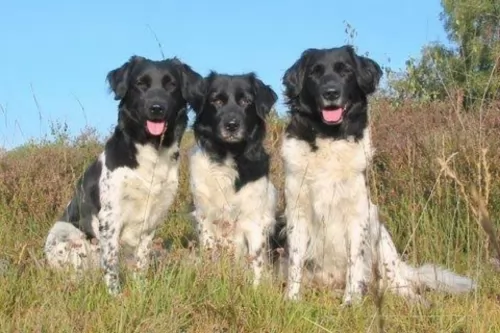 1Feeding the puppy -This is an active, hunting and swimming breed. They need good nutrition and high quality puppy food. A food formulated for active breeds or hunting dogs would be best. Feed your puppy in smaller amounts 3-4 times per day.
1Feeding the puppy -This is an active, hunting and swimming breed. They need good nutrition and high quality puppy food. A food formulated for active breeds or hunting dogs would be best. Feed your puppy in smaller amounts 3-4 times per day.
2.Feeding the adult - This is an active, hunting and swimming breed. They need good nutrition and high quality adult food. A food formulated for active breeds or hunting dogs would be best. Feed your adult twice per day.
4. Games and Exercises – This is an active working dog that needs a lot of exercise every day. A 30 minute walk is only the beginning. They need outdoor time to play and run. They need to swim if at all possible.